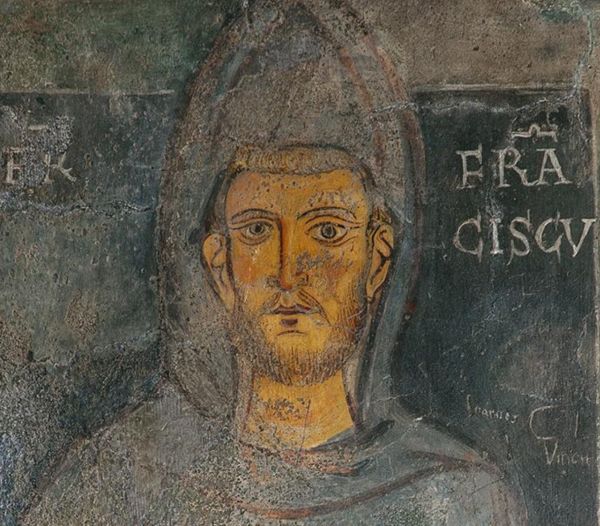The Liturgy of the feast of St Benedict, co-patron of Europe, emphasises the theme of leaving everything for Christ, for the Gospel, reciprocated by the hundredfold and the Life of the Eternal.
Benedict, like Francis, left all possessions to follow Jesus, summing up his path in the famous axiom: 'Ora et labora', 'pray and work'.
Sometimes the severity of Benedictine monastic asceticism is contrasted with Franciscan cheerfulness, as if St Benedict and St Francis were two separate universes; but this is not the case.
There are elements in which they differ and others in common, perhaps elaborated differently.
Both consider prayer and work important. As well as prayer as the path leading to detachment from everything and interiorisation, the place of encounter with Christ - to be put before everything.
Francis, too, considers work an important aspect of his life and of the Minorite Rule, recalling in this the Benedictine one.
The Poor Man, although not Benedictine (as depicted in the Sacro Speco of Subiaco, in an ancient image) also lived within a history that preceded him, drawing from it some things, others rejecting them.
Those familiar with the Franciscan Sources, wishing to affirm the novelty of Brother Francis compared to St Benedict of Norcia, refer to a passage in the Compilatio Assisiensis.
In it it is narrated how during a Chapter at the Portiuncula, where the Minorite Rule was being discussed, some brothers proposed the adoption of earlier forms of life.
But Francis replied:
"My brothers, my brothers, God has called me to the way of humility and shown me the way of simplicity. Therefore, I do not want you to name me any other Rule, neither that of St Augustine, nor that of St Bernard or St Benedict.
The Lord told me that this is what he wanted:
that I should be in the world a 'new fool'; and the Lord does not want to lead us by any other path than that of this science!" (FF 1564).
The greatness of the Benedictine Rule does not lie so much in its contribution of novelty, but in its ability to synthesise the various previous monastic experiences in a sort of sapiential reading.
But these saints both place great importance on work that overcomes idleness and makes one live in the constant Presence of Christ in history, to which they put everything before him.
Continuous prayer and constant work are therefore two common elements differently elaborated, but fundamental for the following of Jesus and detachment from everything.
Francis taught the brothers:
"In prayer we purify our feelings and unite ourselves with the one, true and supreme Good and reinvigorate virtue [...].
In prayer we speak to God, we listen to him and we linger in the midst of the angels; in preaching, on the other hand, we must often descend to men and, living as men among men, think, see, say and listen in the human way" (FF1204).
In his Testament, the Minim writes:
"And I worked with my hands, and I want to work; and I firmly want all the other brothers to work in a manner befitting honesty.
Those who do not know, let them learn, not out of greed to receive the reward of work, but to set an example and keep idleness at bay" (FF 119).
And it is precisely this approach of thought and life that made the Benedictines capable of building Europe "by making the everyday heroic and the everyday heroic" and that drove the Franciscan friars, among other things, to constant and faithful work especially in the evangelising mission of peace.
Sons of God in a different way, equally projected to follow Jesus, knowing that having left everything for his Kingdom is a guarantee of eternal life.
"And whoever has left houses or brothers or sisters or father or mother or children or fields for my name's sake will receive a hundredfold and inherit eternal life" (Mt 19:29).
S. Benedict patron of Europe (Mt 19:27-29)












